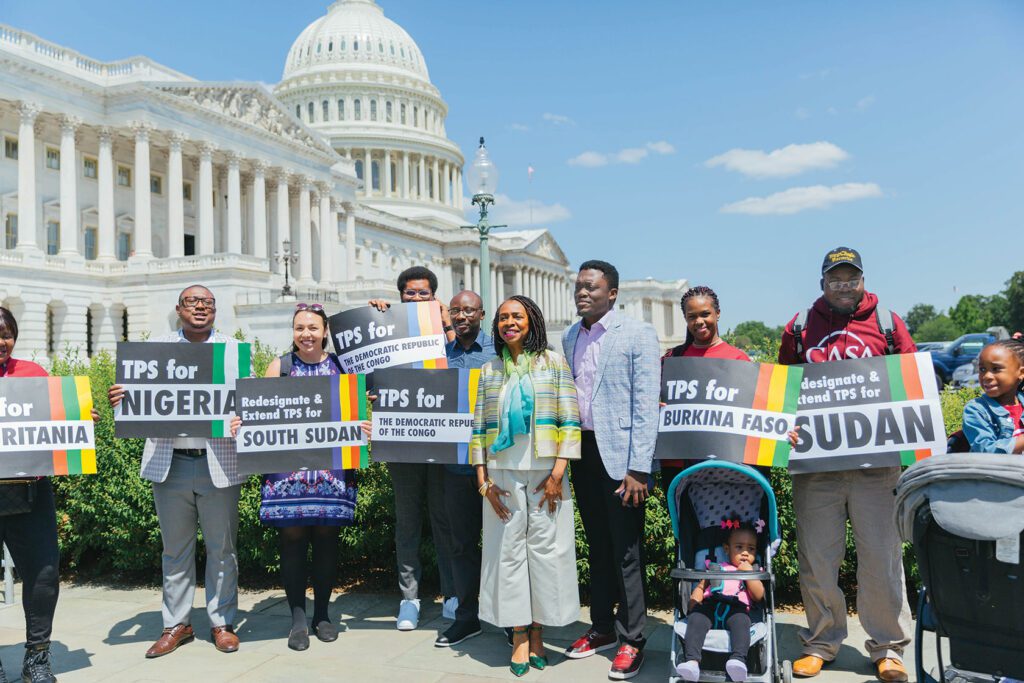Advocates request TPS for African migrants
Rights organizations lobby congress and Biden for change

Immigration advocates are calling on the Biden administration to grant or extend temporary protected status to migrants from seven African countries experiencing ongoing terrorism, civil war, military-sponsored violence and intercommunal violence.
Those countries include Cameroon, Mali, Mauritania, the Democratic Republic of Congo, Nigeria, South Sudan and Sudan. The Census Bureau estimates 2.3% of the U.S. population reports descending from countries in sub-Saharan Africa, including 425,000 people from Nigeria and 62,000 from Sudan.
Created in 1990 by Congress, temporary protective status (TPS) allows migrants from countries with unsafe conditions due to war, natural disasters or other temporary conditions to reside and work legally in the United States for 18 months. They are not considered permanent residents or U.S. citizens, however, even though some grantees may have lived in the country for more than 20 years.
African immigrants’ rights organizations have held news conferences, lobbied Congress, written letters to Biden, Secretary of State Anthony Blinken and homeland security officials, and briefed Congressional Black Caucus members about the conditions in these countries and the need for congressional action in support of migrants.
Diana Konaté is the national policy director for African Communities Together — a nonprofit for African immigrants that provides legal services and advocacy at all levels of government in Philadelphia, New York City and Washington, D.C. She said her organization is working to extend temporary status to migrants from Sudan, South Sudan and Cameroon after it expires in the upcoming months and also to secure the status for migrants from other African countries.
“Our view is that the African continent itself tends to have some of the highest humanitarian needs globally. And unfortunately, what we see when people come to the U.S. and apply for asylum, is that a large number of those people will be denied because the eligibility criteria for asylum is so narrow. And so TPS is a way to protect people who are coming from countries that are experiencing very dangerous conditions,” Konaté said.
The Democratic Republic of Congo does not have the designation, she added, even though 10,000 of the 13,000 African refugees that were resettled in the last fiscal year were from there.
“We are asking the administration to really step up. We’ve been pleased with the fact that they’ve been more willing to protect people using TPS, but we still think that a lot needs to be done,” Konaté said.
Africans fleeing violence in their countries are often either internally displaced within their own countries or flee to neighboring countries before they are able to come to the United States.

Daniel Tse, founder of the Cameroon Advocacy Network, speaking at a TPS press conference. PHOTO: FWD.US
Daniel Tse is the founder of the Cameroon Advocacy Network — a human rights organization that advocates for and supports Cameroonians who are already in the United States. He said there is a double standard when it comes to granting TPS for African immigrants.
“Black immigrants have a tendency of being detained for long periods of time or being placed at a higher standard when it comes to reviewing the applications for whatever form of immigration relief they are applying for,” Tse said.
While the U.S. acted quickly to help Ukrainian migrants fleeing the war, he added, they were reluctant to do so for others.
“So these people were fleeing similar conditions. Afghans fleeing the Taliban, Ukrainians fleeing Russians. Haitians were fleeing gang violence that’s within the country. Cameroonians were fleeing civil unrest. And all of them were seeking safety in the United States, but they are received differently,” Tse said.
Konaté said that it took the U.S. eight days to grant TPS to Ukrainian migrants, but when her organization asked for the status for African migrants, they were met with red tape and resistance.
“The U.S. government came up with a Uniting Ukraine program that allowed 100,000 Ukrainians to come to the U.S. under humanitarian parole. The [2023] war in Sudan, on the other hand, has been ongoing for eight weeks, and we still haven’t heard anything about any kind of humanitarian parole for Sudanese who are similarly fleeing for their lives because of war in their country,” she said.
One of the biggest challenges Tse said his organization has faced is the reluctance of government officials to acknowledge publicly the conflicts currently going on in these countries. The U.S. government even placed travel advisories on Cameroon for diplomats and citizens traveling there, he noted, but it did not offer humanitarian support for Cameroonians.
“They recognize that there’s danger going on in that country just by issuing that travel advisory,” he said. “We did show documentation that shows this ongoing conflict, but then there’s some form of reluctance by the administration to move forward with designating this country for TPS. You ask yourself why, and, honestly, it’s just because it is a Black country.”






